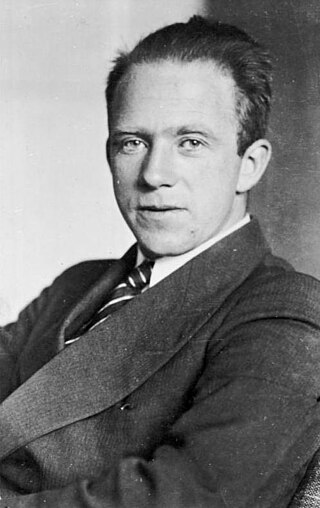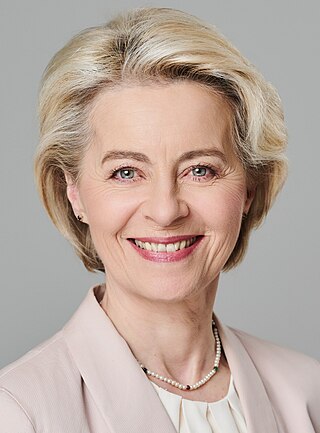
Berlin is the capital and largest city of Germany, both by area and by population. Its more than 3.85 million inhabitants make it the European Union's most populous city, as measured by population within city limits. The city is also one of the states of Germany, and is the third smallest state in the country in terms of area. Berlin is surrounded by the state of Brandenburg, and Brandenburg's capital Potsdam is nearby. The urban area of Berlin has a population of over 4.5 million and is therefore the most populous urban area in Germany. The Berlin-Brandenburg capital region has around 6.2 million inhabitants and is Germany's second-largest metropolitan region after the Rhine-Ruhr region, and the sixth-biggest metropolitan region by GDP in the European Union.

Johann Carl Friedrich Gauss was a German mathematician, astronomer, geodesist, and physicist who contributed to many fields in mathematics and science. He was director of the Göttingen Observatory and professor of astronomy from 1807 until his death in 1855.

The "Deutschlandlied", officially titled "Das Lied der Deutschen", has been the national anthem of Germany either wholly or in part since 1922, except for a seven-year gap following World War II in West Germany. In East Germany, the national anthem was "Auferstanden aus Ruinen" between 1949 and 1990.

Germany, officially the Federal Republic of Germany (FRG), is a country in Central Europe. It lies between the Baltic and North Sea to the north and the Alps to the south. Its sixteen constituent states have a total population of over 82 million in an area of 357,569 km2 (138,058 sq mi), making it the most populous member state of the European Union. It borders Denmark to the north, Poland and Czechia to the east, Austria and Switzerland to the south, and France, Luxembourg, Belgium, and the Netherlands to the west. The nation's capital and most populous city is Berlin and its main financial centre is Frankfurt; the largest urban area is the Ruhr.

German is a West Germanic language in the Indo-European language family, mainly spoken in Western and Central Europe. It is the most widely spoken and official or co-official language in Germany, Austria, Switzerland, Liechtenstein, and the Italian province of South Tyrol. It is also an official language of Luxembourg and Belgium, as well as a recognized national language in Namibia. There further exist notable German-speaking communities in France (Alsace), the Czech Republic, Poland, Slovakia, Denmark, Romania and Hungary (Sopron).

East Germany, officially known as the German Democratic Republic, was a country in Central Europe from its formation on 7 October 1949 until its reunification with West Germany on 3 October 1990. Until 1989, it was generally viewed as a communist state and described itself as a socialist "workers' and peasants' state". The economy of the country was centrally planned and state-owned. Although the GDR had to pay substantial war reparations to the Soviets, its economy became the most successful in the Eastern Bloc.

Werner Karl Heisenberg was a German theoretical physicist, one of the main pioneers of the theory of quantum mechanics, and a principal scientist in the Nazi nuclear weapons program during World War II. He published his Umdeutung paper in 1925, a major reinterpretation of old quantum theory. In the subsequent series of papers with Max Born and Pascual Jordan, during the same year, his matrix formulation of quantum mechanics was substantially elaborated. He is known for the uncertainty principle, which he published in 1927. Heisenberg was awarded the 1932 Nobel Prize in Physics "for the creation of quantum mechanics".

During the later stages of World War II and the post-war period, Germans and Volksdeutsche fled and were expelled from various Eastern and Central European countries, including Czechoslovakia, and from the former German provinces of Lower and Upper Silesia, East Prussia, and the eastern parts of Brandenburg (Neumark) and Pomerania (Hinterpommern), which were annexed by Poland and the Soviet Union.

Angela Dorothea Merkel is a German retired politician who served as Chancellor of Germany from 2005 to 2021 and was the first woman to hold that office. She previously served as Leader of the Opposition from 2002 to 2005 and as Leader of the Christian Democratic Union from 2000 to 2018. During her chancellorship, Merkel was frequently referred to as the de facto leader of the European Union (EU) and the most powerful woman in the world. Beginning in 2016, she was often described as the leader of the free world.

Rosemarie Magdalena Albach, known professionally as Romy Schneider, was a German-French actress. She is regarded as one of the greatest screen actresses of all time and became a cult figure due to her role as Empress Elisabeth of Austria in the Sissi trilogy in the mid-1950s. She later reprised the role in a more mature version in Luchino Visconti's Ludwig (1973). She began her career in the German Heimatfilm genre in the early 1950s when she was 15. Schneider moved to France, where she made successful and critically acclaimed films with some of the most notable film directors of that era. Her performance in That Most Important Thing: Love is regarded as one of the greatest in the history of cinema. Coco Chanel called Romy “the ultimate incarnation of the ideal woman.” Bertrand Tavernier remarked: “Sautet is talking about Mozart with regard to Romy. Me, I want to talk of Verdi, Mahler…”

The Reichstag fire was an arson attack on the Reichstag building, home of the German parliament in Berlin, on Monday, 27 February 1933, precisely four weeks after Adolf Hitler was sworn in as Chancellor of Germany. Marinus van der Lubbe, a Dutch council communist, was the alleged culprit; however, Hitler attributed the fire to Communist agitators. He used it as a pretext to claim that Communists were plotting against the German government, and induced President Paul von Hindenburg to issue the Reichstag Fire Decree suspending civil liberties, and pursue a "ruthless confrontation" with the Communists. This made the fire pivotal in the establishment of Nazi Germany.

Der Spiegel is a German weekly news magazine published in Hamburg. With a weekly circulation of about 724,000 copies in 2022, it is one of the largest such publications in Europe. It was founded in 1947 by John Seymour Chaloner, a British army officer, and Rudolf Augstein, a former Wehrmacht radio operator who was recognized in 2000 by the International Press Institute as one of the fifty World Press Freedom Heroes.

The Bundeswehr is the armed forces of the Federal Republic of Germany. The Bundeswehr is divided into a military part and a civil part, the military part consisting of the German Army, the German Navy, the German Air Force, the Joint Support Service, the Joint Medical Service, and the Cyber and Information Domain Service.

The German revolution of 1918–1919, also known as the November Revolution, was an uprising started by workers and soldiers in the final days of World War I. It quickly and almost bloodlessly brought down the German Empire, then in its more violent second stage, the supporters of a parliamentary republic were victorious over those who wanted a Soviet-style council republic. The defeat of the forces of the far Left cleared the way for the establishment of the Weimar Republic. The key factors leading to the revolution were the extreme burdens suffered by the German people during the war, the economic and psychological impacts of the Empire's defeat, and the social tensions between the general populace and the aristocratic and bourgeois elite.

The Autobahn is the federal controlled-access highway system in Germany. The official term is Bundesautobahn, which translates as 'federal motorway'. The literal meaning of the word Bundesautobahn is 'Federal Auto(mobile) Track'.

The Super League is a Swiss professional league in the top tier of the Swiss football league system and has been played in its current format since the 2003–04 season. As of March 2024, the Swiss Super League is ranked 12th in Europe according to UEFA's ranking of league coefficients, which is based upon Swiss team performances in European competitions. The 2023–24 season will be the 127th season of the Swiss top-flight, making it the longest continuously running top-flight national league.

Ursula Gertrud von der Leyen is a German politician, serving as the 13th president of the European Commission since 2019. She served in the German federal government between 2005 and 2019, holding positions in Angela Merkel's cabinet, most recently as federal minister of defence. She is a member of the centre-right Christian Democratic Union (CDU) and its affiliated europarty, the European People's Party (EPP). On 7 March 2024, the EPP elected her as its Spitzenkandidat to lead the campaign for the 2024 European parliament elections. She was re-elected to head the Commission in July 2024.

1. Fußballclub Union Berlin e. V., commonly known as Union Berlin, is a professional German football club based in Köpenick, Berlin.

RasenBallsport Leipzig e.V., commonly known as RB Leipzig, is a German professional football club based in Leipzig, Saxony. The club was founded in 2009 by the initiative of the company Red Bull GmbH, which purchased the playing rights of fifth-tier side SSV Markranstädt with the intent of advancing the new club to the top-flight Bundesliga within eight years. The men's professional football club is run by the spin-off organization RasenBallsport Leipzig GmbH. RB Leipzig plays its home matches at the Red Bull Arena. The club nickname is Die Roten Bullen.



















